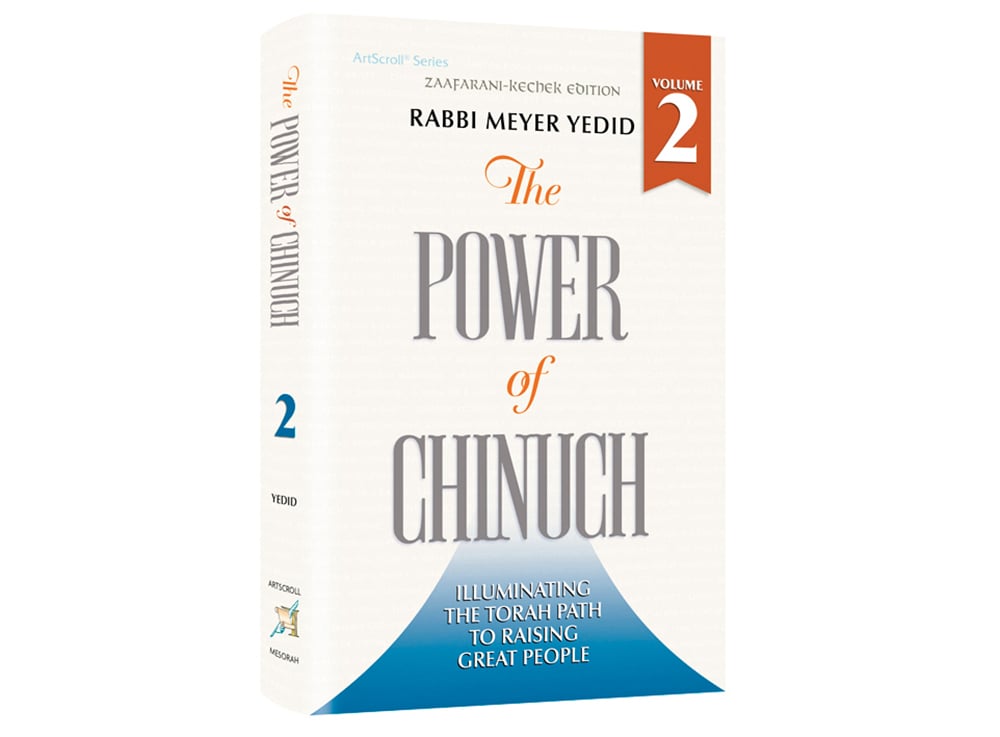
Excerpting: “Power of Chinuch, Volume 2,” by Rabbi Meyer Yedid. Artscroll Mesorah Publications. 2022. Hardcover. 288 pages. ISBN-13: 978-1422632338.
(Courtesy of Artscroll) There’s a pasuk in Shir HaShirim (8:9) that I hope no one will forget after they understand its depth. Shlomo HaMelech in Shir Hashirim (8:9) wrote cryptically, “If she is a wall, we can build upon her a palace of silver. If she is a door, we can construct upon her cedar panels.”
What did Shlomo HaMelech, the wisest of all men, allude to here?
He’s teaching us that every person must ask himself or herself: Am I a wall or a door?
A wall is a solid, impenetrable barrier. If you are a wall, then when you instruct your children to do something, they don’t try to challenge you, just as they wouldn’t try to walk through a wall. If that’s the case, then you can build a “palace of silver” — i.e., a strong and beautiful edifice — upon that wall.
A door, on the other hand, might look as solid as a wall, but if you turn the handle and push, you can suddenly pass to the other side. If your rules are like doors, because you waver as to when you enforce them and when you will be lax and permissive about them, then you will be able to construct only “cedar panels” — i.e., a flimsy building — upon them.
Now, parents must carefully consider what to allow and what to prohibit in their homes. Parents often make the mistake of saying no too often, and then they have a list of rules that is so extensive that it’s nearly impossible to enforce. So it’s not always the right thing to say no. But if you did say no, you have just added an element to your house. The question is whether that element will be a wall or a door. Will you make that an impenetrable barrier, or will you waver about it, like a door swinging back and forth?
A father or mother or teacher or rabbi who is a door makes rules, but just as someone who has the key to a door can enter through it, if children can find the “key” — kicking and screaming, arguing, crying, or whatever — they can bypass the rule.
When children see that you are a door, all that can be built upon you is a paneled room. Your children won’t have strength, and they won’t have beauty.
But if you are a wall, and your children realize that your rules are impenetrable, then you can build a silver palace — your children will exhibit beauty and strength.
How does this work?
Did you ever watch a person who suddenly realizes that he is locked out of a door? First he’ll try banging on the door to try to get someone to open up. When he realizes that no one hears him, he’ll try kicking the door or jiggling the handle to see if he can get it to open. Sometimes he’ll even take out a credit card and try to “break and enter.” He can spend an hour at it, growing more frustrated with each failed attempt.
Did you ever see someone try this at a brick wall? No one screams and kicks at it to try to pry it open. If you would see a person trying to do that, you would probably call an ambulance to send that person straight to the psychiatric ward.
What’s the difference between the two scenarios?
It’s obvious to everyone that you can’t break through a wall, so no sane person tries. But a door presents you with a valid chance to get to the other side, so you try.
A child who sees that his parents are walls lives in comfort. He knows that whatever his parents say is final, and he doesn’t have to get frustrated trying to break through their rules.
What happens in many homes, though, is that you make rules, and then the children start to cry or scream or beg. Maybe you have a headache and can’t handle the noise, or maybe it’s just that you want to see your children happy, so you decide to relax the rule. Perhaps you even think that you are doing a great deed, sacrificing yourself for the sake of your children’s happiness. What’s actually happening is the opposite — you’re making them more miserable in life. Because the next time they bump into one of your rules, rather than just accept that it’s final, they’ll try to soften you up again. But perhaps that rule will be more important to you, or it will just be a better day and you won’t mind dealing with the crying, so you will refuse to back down. They will then spend an hour — or perhaps multiple hours or even days — trying to get you to change your mind. And they will be miserable throughout that time.
What every parent must do, then, is to stick to the rules they set.
You can be nice about it.
You can say, “I don’t want to be a dictator, but I have to insist that you follow this rule for your own good.” What you’ll find, as a result, is that your children will be much happier. You’ll give them instructions, and they’ll follow them happily, because they know that there’s no point in arguing with you. No one gets frustrated when they can’t get through a wall in their path.
Reprinted from Power of Chinuch Volume 2, by Rabbi Meyer Yedid with permission from the copyright holder, ArtScroll Mesorah Publications.









